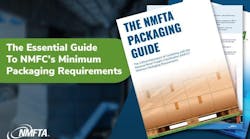With the Washington State Patrol now actively enforcing truck weight limits on bridges leading to Aberdeen, WA — particularly the Chehalis and Wishkah bridges — heavy equipment and large trucks cannot legally come into the area, making the island essentially a place trucks can leave but can’t get back to, according to a report in The Daily World.
Law enforcement had previously turned a blind eye to trucks that exceeded the weight limits crossing the bridges. But recently Washington State Patrol has been enforcing the weight restrictions, which is hitting truckers in the area where it hurts — the pocketbook. A single over-the-weight fine on the Chehalis River Bridge can cost a trucking company upwards of $17,000 and enough fines can lead to a truck being impounded.
The problem is further exacerbated by the work on the pontoon project for the new Highway 520 floating bridge project being constructed on the shore of Grays Harbor that requires large loads and heavy equipment. Weight restrictions on the bridges have caused issues for semi trucks hauling supplies to the pontoon construction site and other truckers in the area who have been forced to take long detours to provide services to the area.
Truckers are being hit hard with detours that take literally hours of extra time, gallons of costly fuel, according to Kathi Hoder, Aberdeen city councilwoman. Hoder said that the detours are also causing a safety hazard by forcing trucks to travel dangerous routes on curvy roads that are icy in winter, like the “infamous” 13 Corners.
“The bridge and road restrictions in this area are crippling our ability to do commerce,” said Hoder, who is also the owner of Hoquiam Licensing and Transportation Agencies in Aberdeen.
To minimize impact to the bridge, trucks carrying heavy loads must straddle the lane line and take up both lanes in one direction on the four-lane bridge, with no cars being able to pass the truck as it crosses over the bridge.
The issue is also catching some truckers unaware since reportedly none of the bridges have signs posted with the weight restrictions.
Jim Wright, owner of Brundage Bone Concrete Pumping, with a truck yard in south Aberdeen, said he recently began having repeated trouble getting his trucks over the bridge to work at the pontoon project because they were being pulled over. Rather than the easy, 15-minute drive, the trucks were forced to take a circuitous, dangerous route that took between 45 minutes to an hour, he said at a public meeting last week to discuss the issue.
With tensions brewing, Hoder had convened the meeting that included representatives of trucking companies, Aberdeen and Hoquiam police and the Washington State Patrol, as well as Aberdeen Mayor Bill Simpson, Kevin Dayton of the Dept. of Transportation and Aberdeen State Rep. Brian Blake.
When law enforcement threatened to impound one of his trucks if it was seen crossing the bridge again, Wright thought about throwing in the towel on doing business in this area, he said at the meeting. Instead, he got on the phone and started making calls.
Eventually, Wright was able to get a letter from DOT granting his company an exemption to cross the bridge with a higher weight load.
But while the exemption works for Wright, it doesn’t apply to any other truckers using the bridges.
“We can’t wait, we need immediate action. We need the tickets to slow down,” Frank Scherer of Quigg Brothers Construction said in the meeting. Another member of the audience called for leniency until a decision can be made on how to fix the situation.
As a result of the meeting, DOT’s Dayton promised he will work on finding quick, short-term solutions—whether that is exemptions or quick repairs to the bridges that may lessen problems with higher weight loads.
The ultimate solution is to build new bridges. “The bridges are old, decrepit and beat up. But it takes money and it takes time,” Dayton said, money the state doesn’t have.


